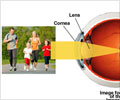Researchers at the University of Alabama at Birmingham (UAB) School of Optometry are studying the risks and benefits of using contact lenses by analysing tears.
Researchers at the University of Alabama at Birmingham (UAB) School of Optometry are exploring the risks and benefits of using contact lenses by analysing tears.
The researchers say that biological changes in the eye can be measured through minor fluctuations in the level of inflammatory proteins called cytokines, which are present in the tear film.Cytokines are strong indicators of overall eye health, especially in contact wearers.
During a study, UAB doctoral student Lucy Kehinde prescribed volunteers to wear a type of contact lens called silicone hydrogels daily or for a 30-day schedule.
Her early tear-research results show that even minor changes in eye biology can inform lens-wear prescribing and patient preference.
"It is helping us to understand and get a clearer picture of eye health during the course of a month, which is the length of time some people choose to keep in their extended-wear contacts. The choice between lenses should be taken seriously in terms of reducing the risk of eye infections and other sight problems," she said.
Presented at the Association for Research in Vision and Ophthalmology (ARVO) annual meeting in Fort Lauderdale, Florida, the study included 80 volunteers who collected their tears in ultra-thin glass tubes smaller than a coffee stirrer.
Advertisement
Kehinde says that study tears must be non-stimulated since cytokine levels are skewed by stimulated or emotional tears.
Advertisement
"We may be able to use this data to develop new diagnostic tools that would identify good candidates for extended-wear lenses, or find those who are better suited for daily-wear lenses," she said.
Source-ANI
THK










